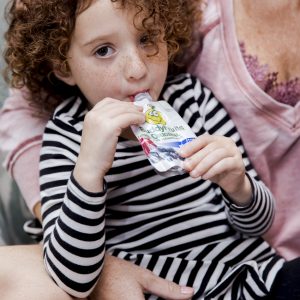Is School Stress Causing Your Child’s Nervous Stomach?
As the school year draws to a close and kids are inundated with standardized tests and end-of-the-year exams, thousands of children will head to their pediatrician or the ER with belly pain. Added stressors can cause anxiety that may present with belly pain. As a pediatrician and a mom, I know firsthand how hard it can be to determine whether the tummy ache is just nerves or something we really need to worry about. Stress and anxiety can definitely cause a “nervous stomach.” So let’s break down the common causes of stress and stomach pain in kids, important treatment options available, and when a tummy ache may be more than just a nervous stomach.
Diagnosing and Treating Stress and Stomach Pain in Kids
Is this tummy ache real or is stress causing my child’s stomach pain?
Although there is no way to be sure whether your child is faking it or has real stomach pain, it is important not to dismiss their pain. Rather, try and get to the root of the problem. You can usually pinpoint the cause by knowing where your child is experiencing pain. If you can’t come up with a real concrete cause for their belly pain, talk to your child about the stressors in their life. Children cope with stress in many different ways. Ask them how they feel about school and exams and what concerns they have. Many times, they just need our support and reassurance. It is amazing what encouraging words can do for our children.
Gastritis
Diet along with school stress can cause gastritis. Gastritis is an irritation of the lining of the stomach. Your child will typically complain of a persistent burning sensation in the upper middle portion of the stomach. Depending upon the cause of the gastritis, this pain can either get worse or better with food. Along with this pain, they may also have symptoms of nausea, bloating, and decreased appetite. If your child is someone who already suffers from gastritis, you might find that their symptoms get worse during stressful times at school.
It is important to have the right medicines in the house to combat the symptoms. In the past, there wasn’t much on the market to help treat symptoms associated with upset stomach and indigestion. Mylicon has recently come out with a line of Children’s Tummy Relief that is the only multi-symptom product available for upset tummies for kids ages 2-11! They are fast acting, chewable tablets that have active ingredients, including antacids to treat gas, bloating, and indigestion.
Diet is also very important when trying to alleviate the symptoms of gastritis. There are certain foods that exacerbate your child’s symptoms. Avoid spicy foods, tomatoes, citrus, chocolate, and caffeine (found in soda and tea). A number of things can cause gastritis, so it is important to have your child evaluated by the pediatrician. If your child has severe abdominal pain, vomiting, or black, tarry stools, see your pediatrician immediately.
Constipation
Juggling after-school activities and studying for exams not only causes extra stress but also leads to dinners on the go and unhealthy snacking. During this time of year, children may be staying up later at night and not hydrating as well as they should during and after sporting events. All of these factors cause poor digestion and possibly constipation.
By definition, constipation is infrequent bowel movements with difficulty or pain passing stool. Constipation causes a variety of symptoms, making it difficult to diagnosis. Your child will typically complain of a lower belly pain that is crampy in nature. The pain is usually intermittent and worsens after eating. They may also complain of pain with bowel movements and have stool that is hard and dark in consistency.
Constipation can also lead to gas, which can be very sharp and painful in nature. The intense nature of gas pain brings thousands of worried parents to the emergency room annually. It is important to alleviate gas pain as it can cause extreme discomfort for your child. Children’s Mylicon Gas Relief contains the same active ingredients doctors and parents have trusted for decades for infants, now available in chewable form for older kids. These chewable tablets are fast-acting, gentle on the stomach, and safe.
Once the gas pain is under control, it is important to treat the constipation. Never start your child on a laxative without the guidance of their pediatrician. Their doctor might want to perform labs and imaging and will create a treatment plan that is best for your child. Diet is an important part of healthy digestion. Starting a high fiber diet and ensuring your child is drinking a lot of water is very important to alleviating constipation. If at anytime your child is experiencing persistent or worsening abdominal pain, vomiting, or fever, have them evaluated immediately.
Irritable Bowel Syndrome
More and more children are being diagnosed with irritable bowel syndrome or IBS. IBS is a gastrointestinal disorder that causes a cluster of symptoms including abdominal pain, bloating, and bouts of diarrhea and constipation. It is more commonly found in the adolescent population but can occur in any age group. Many children with IBS also exhibit signs of anxiety or depression, although a direct relationship hasn’t been established. Stress, such as that caused by pressures at school, can lead to worsening symptoms. If your child suffers from these symptoms, take them in to see their pediatrician. Lab work and imaging may be necessary.
Functional Abdominal Pain
Functional abdominal pain is the most common cause of chronic abdominal pain in the tween and adolescent population. This pain is recurrent in nature and typically occurs around the belly button. Bloating, nausea, and lost of appetite may occur. Functional abdominal pain is a diagnosis of exclusion. Labs and imaging reveal no organic cause for the pain, however, this lack of evidence doesn’t mean your child is faking their pain. Life can be very frustrating for the child suffering with chronic belly pain and the parents alike. Many times conventional pain management doesn’t work. Diet and alternative methods of pain management have shown to be helpful in the treatment of this pain.
Final Thoughts
While we have discussed some of the common causes of stress and stomach pain in kids, unfortunately we can’t possibly cover all related issues. There are many things that can cause belly pain in children, some benign and some more serious. I have never told a parent it was a mistake to bring their child in to be evaluated. The reality is, once you become a parent, you develop what I like to call, “mommy or daddy instinct.” If your instinct tells you something is not right, you should immediately have your child evaluated. If a doctor says your child is fine, but you still feel there is something very wrong, get them re-evaluated. As parents, we are our children’s only voice!
Dr. Katie
*This post is sponsored, but all opinions are my own*
FOREVER FRECKLED DOES NOT PROVIDE MEDICAL ADVICE, DIAGNOSIS, OR TREATMENT. ADDITIONAL INFORMATION AND TERMS OF USE.



